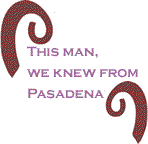Recently
my father, Walter Worrill, sent me an article from
the October 8, 2009 issue of the Los
Angeles Times. The article focused on the debate around the
naming of the $24 million sports complex on Fair
Oaks Avenue in Pasadena, California.
 First, I have to acknowledge that I was born in Pasadena, California on August 15, 1941 in Huntington
Hospital to Walter and Anna Bell Worrill. My mother made her transition
two years ago. My father’s family and the Robinson family were
among the wave of Black families, who
migrated from Georgia
to California. Both
families settled in Pasadena
but neither knew the other. During his early teen years,
my father met the Robinson brothers and their family. Because
there were very few African American families in Pasadena
at that time, it fostered intimate interactions
between those few African American families who lived in Pasadena. My mother, who was close to Jackie’s age, later became acquainted with the Robinson family.
First, I have to acknowledge that I was born in Pasadena, California on August 15, 1941 in Huntington
Hospital to Walter and Anna Bell Worrill. My mother made her transition
two years ago. My father’s family and the Robinson family were
among the wave of Black families, who
migrated from Georgia
to California. Both
families settled in Pasadena
but neither knew the other. During his early teen years,
my father met the Robinson brothers and their family. Because
there were very few African American families in Pasadena
at that time, it fostered intimate interactions
between those few African American families who lived in Pasadena. My mother, who was close to Jackie’s age, later became acquainted with the Robinson family.
I
provide this background because my father,
who is now 95 years old, moved back
to Pasadena to be close to our family members who still reside in Pasadena
and southern California. My father attended junior high, high school, and junior college with Mack
Robinson and intimately observed the development of Mack’s younger
brother Jackie. His career in the Pasadena YMCA began as a part
time staff member. After graduating from Whittier
College, he
became a staff member of the 28th Street Branch YMCA in Los Angeles from 1942-44, during the War years, before returning to
the Pasadena YMCA staff from 1944-50. Because of my father’s work, I was deeply impacted by the history that he shared with me and what
I observed as his son.
 In
1950, our family moved to Chicago where my father took an assignment with the YMCA of Metropolitan
Chicago. He spent twenty-one years with the Chicago YMCA in a
variety of assignments. From 1971, until
his retirement in 1980, he served as
the Executive Director of the Mid-Atlantic Region of the National
Council of the YMCA based in New
Jersey. Throughout the years, my father
maintained his ties to Pasadena
and particularly with his childhood friends Mack Robinson and
Mr. Ray Bartlet. My family always kept a deep connection to Pasadena by staying abreast of the many events
and developments in the city, particularly
as it related to the African American community.
In
1950, our family moved to Chicago where my father took an assignment with the YMCA of Metropolitan
Chicago. He spent twenty-one years with the Chicago YMCA in a
variety of assignments. From 1971, until
his retirement in 1980, he served as
the Executive Director of the Mid-Atlantic Region of the National
Council of the YMCA based in New
Jersey. Throughout the years, my father
maintained his ties to Pasadena
and particularly with his childhood friends Mack Robinson and
Mr. Ray Bartlet. My family always kept a deep connection to Pasadena by staying abreast of the many events
and developments in the city, particularly
as it related to the African American community.
As
a young boy my father shared stories with us about the great athletic
accomplishments of Mack and Jackie Robinson. I remember them well!
His stories about being on the winning 1934 State Championship
Track Team with Mack Robinson, Brainard
Worrill, Joe Cunningham, and William Sangster were
so exciting to me. I especially remember what he said about Mack
making the United States Olympic Track Team in 1936 and winning
a silver medal behind the great Jesse Owens in Berlin. I even have a copy of the telegram my father
sent Mack congratulating him on his accomplishment. I also have
a copy of Mack’s response acknowledging receipt of my father’s
letter and how humbled he was to place second to the great Jesse
Owens.
Personally, I have had some unique experiences with the Robinson Brothers. I remember
when my father was the Executive Director of the famous Wabash
YMCA in Chicago in the
early 1950s. He invited Jackie to speak at a banquet at the Y.
I was able to interact with Mr. Robinson in my father’s office
after he concluded his participation in the banquet. I was thrilled
to no end. I remember his leaving tickets at Wrigley Field and
my father and I attended our first major league baseball game.
This man, we knew from Pasadena.

I
can also remember when Mack drove from Pasadena
to Chicago, stayed at my house,
and we attended the funeral of the late Jesse Owens together.
Mack Robinson was like a godfather to me. This man,
we knew from Pasadena.
Many
people may not know that Mack went on to the University
of Oregon where he won the NCAA 220 and
the AAU 200 meters in 1937. He was considered a world class 200
meter runner during this era. We must not forget that Mack’s accomplishments
occurred during the period of the Great Depression.
It
is not often mentioned that Mack’s younger brother,
Jackie, was motivated to become the great athlete that he was because of the
inspiration he received from the accomplishments of his big brother.
Jackie became a great all around athlete at Pasadena Junior College and later at UCLA.
When some in Pasadena argue that the park should be named only
for Jackie, who emerged in a different
era to break the color barrier in major league baseball and be
inducted into the Baseball Hall of Fame,
it should not overshadow the historical reality of the twinness
of the athletic accomplishments of the Robinson brothers to the
city of Pasadena, California. Without
Mack’s achievements, there may not have been an opportunity for
Jackie to be as inspired as he was to accomplish his great athletic
feats. Because of Mack, Jackie was exposed to the possibility of achieving greatness.
 The
City of Pasadena should be reminded of the words that provided
the rational of the twinness of the Robinson Brothers to be remembered
in the busts of the sculptures for all to see. These words should
also be the foundation of the rational in naming the sports complex
in their honor. You cannot separate Mack from Jackie nor Jackie
from Mack. They were both uniquely gifted and outstanding athletes
who contributed immensely in their chosen arenas. These athletic
pursuits were made in different eras and under different circumstances
in time and space.
The
City of Pasadena should be reminded of the words that provided
the rational of the twinness of the Robinson Brothers to be remembered
in the busts of the sculptures for all to see. These words should
also be the foundation of the rational in naming the sports complex
in their honor. You cannot separate Mack from Jackie nor Jackie
from Mack. They were both uniquely gifted and outstanding athletes
who contributed immensely in their chosen arenas. These athletic
pursuits were made in different eras and under different circumstances
in time and space.
As
a Professor of Education and History and Director of the Jacob H. Carruthers Center for Inner City Studies of Northeastern Illinois University,
as part of my work, I strive to preserve
the contributions of African and African American people for the
world. This work has led me to become a very passionate advocate
of the truth concerning our people and I have written some of
these truths in hundreds of articles that have appeared in numerous
newspapers throughout the United States. It is in this spirit that I am
humbled to write these words in this column to uplift the spirit
of two brothers, Mack and Jackie, whom I feel should be honored forever and ever, in Pasadena most especially, for the “Twinness”
of their accomplishments. We should not separate them from each
other. In this regard, I reiterate my support, for whatever it
means, of the naming of the sports complex
on Fair Oaks Avenue
in Pasadena, California in honor of Mack and Jackie,
the Robinson Brothers.
In
closing, I think that it is fitting to remember that in the dedication of the
Pasadena Robinson Memorial it stated the following:


































 In
1950
In
1950
 The
City of
The
City of 












